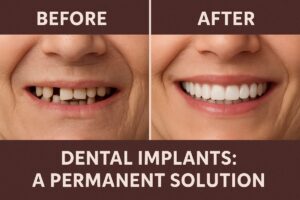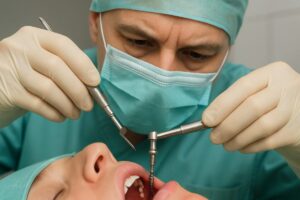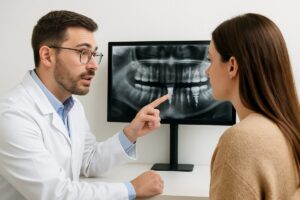An implant dentist places and restores dental implants — artificial tooth roots that support crowns, bridges, or full-mouth teeth. Choosing the right implant dentist matters for more than looks: it affects long-term oral health, comfort, and the chance your implant will last for decades. This post will help you evaluate skill, technology, safety, and patient care so you can confidently choose an implant dentist by Fort Wayne & Auburn who meets your needs.
Why choosing the right implant dentist matters
The training and skill of an implant dentist by Fort Wayne & Auburn directly affect success rates, complication risk, and final esthetic results. Precise planning and careful surgery lower the chance of infection, nerve damage, or failed integration. A well-trained implant dentist also delivers restorations that look natural and function reliably, protecting neighboring teeth and jawbone health. Patient safety and predictable outcomes hinge on experience, technology, and follow-up care.
Credentials & experience to look for in an implant dentist by Fort Wayne & Auburn
Formal training and certifications
Expect a DDS or DMD plus postgraduate implant training. Memberships and fellowships — for example with implant organizations or the Academy of General Dentistry — show ongoing education. These credentials mean the implant dentist by Fort Wayne & Auburn keeps up with best practices and safety standards.
Proven clinical experience
Look for real-world experience with single implants, multiple implants, and full-mouth reconstructions. Ask how many implants the dentist has placed, how long they’ve been treating complex cases, and whether they manage both surgery and restoration or work with specialists. Evidence of successful complex cases signals the ability to handle your needs.
Technology & techniques a modern implant dentist by Fort Wayne & Auburn should use
Advanced diagnostics
3D imaging (CBCT), digital impressions, and treatment planning software improve accuracy. These tools let the implant dentist by Fort Wayne & Auburn map critical anatomy, plan implant position, and predict outcomes before surgery, reducing risk and improving fit and esthetics.
Contemporary implant systems & materials
Modern implant systems, guided-surgery templates, and high-quality restorative materials produce better long-term results. The choice of implant brand and the use of surgical guides influence healing and prosthetic fit. Ask which systems the implant dentist by Fort Wayne & Auburn uses and why.
Comfort & sedation options
Comfort choices matter if you’re anxious or need longer procedures. Options include nitrous oxide, oral sedation, and light-conscious IV sedation. An implant dentist by Fort Wayne & Auburn who offers multiple sedation levels can tailor care to your comfort and medical needs, improving access to complex treatments.
Red flags: warning signs when evaluating an implant dentist
Be cautious if a practice offers no consultation or imaging, provides vague treatment plans, or quotes very low prices without explanation. Lack of before/after photos, no clear emergency or follow-up plan, or pressure to choose a single treatment option are also warning signs. A reputable implant dentist by Fort Wayne & Auburn will explain options, risks, and follow-up care clearly.
Key questions to ask an implant dentist by Fort Wayne & Auburn during your consultation
Ask about success rates, alternative treatments, who performs each step (surgery vs restoration), estimated timeline, expected costs, and sedation options. Request details on aftercare and what happens if a problem arises. Also ask to see cases similar to yours and whether a CBCT scan will be used in planning.
What to expect during treatment and recovery with an implant dentist
Typical steps include consultation and imaging, extraction or bone grafting if needed, implant placement, healing (osseointegration), and final restoration. Timelines vary: single implants may take a few months from start to finish; full-mouth reconstructions can take longer. Pain is usually managed with short-term medication and ice; most patients return to normal activity within days and routine follow-ups monitor healing.
How to verify results: reviews, before/after photos, and referrals
Read online reviews and look for patterns about communication, pain control, and long-term results. Ask the implant dentist by Fort Wayne & Auburn for before/after photos of cases like yours and, where allowed, patient referrals. Verify that results are consistent with what the dentist promises and that patients report durable, natural-looking outcomes.
About Sedation & Implant Dentistry and Dr. David Painter
Sedation & Implant Dentistry serves Fort Wayne and Auburn with family and implant care focused on comfort and predictable results since 1995. Dr. David Painter earned his DDS from Indiana University and continues advanced study in implantology and sedation. He is a fellow of several implant and dentistry organizations and is among the few general dentists in the region certified in light-conscious IV sedation. Dr. Painter treats single implants through full-mouth reconstructions and emphasizes individualized care and long-term oral health.
What their technology and sedation expertise mean for you
Dr. Painter’s use of CBCT, modern implant systems, and light-conscious IV sedation helps ensure accurate planning, comfortable procedures, and strong restorative outcomes. These capabilities let the implant dentist by Fort Wayne & Auburn offer complex reconstructions with predictable, patient-focused care.
Next steps: how to choose and schedule a consultation with an implant dentist by Fort Wayne & Auburn
Before your visit, gather medical and dental history, a list of medications, and photos of your smile goals. Prepare questions from earlier in this post and request a treatment timeline and cost estimate. Book a consultation to review imaging, treatment options, and sedation choices. A careful, transparent consultation with an implant dentist by Fort Wayne & Auburn will help you make the right, lasting choice for your smile.






